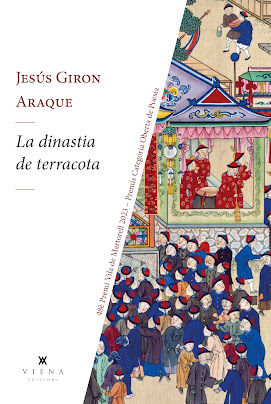 |
| (Imatge no identificada presa de la xarxa) |
GRATITUD
SALVATGE
Aquesta
nit, mentre m'agenollava al costat de la nostra gata,
la
Zooey, i ficava els dits a la seva boca neta de gat,
i
li fregava la panxa inflada que no coneixerà gatets,
i
veia com es cargolava de costat i esgarrapava l'aire,
i
escoltava els seus miols de plaer, petits i solemnes,
m'ha
vingut al cap el poeta Christopher Smart,
que
volia agenollar-se i pregar sense treva
en
tots i cadascun dels carrers intricats de Londres,
i
el van tancar al manicomi de Sant Lluc
amb
aquella trista mania religiosa, i aquella gratitud salvatge,
i
les pregàries cerimonioses per als altres llunàtics,
i
el gran amor pel seu gat clapejat, el Jeoffry.
Tot
avui —13 d’agost del 1983— que penso en Christopher Smart
i
en com va beneir aquest mateix dia d'agost del 1759
pel
seu coratge tranquil i la bona consciència habitual.
Va
ser el dia que va beneir el director general de correus
“i
tots els distribuïdors de cartes” per la seva càlida humanitat,
i
els jardiners per la seva particular benevolència
i
ell seu coneixement complex del llenguatge de les flors,
i
els lleters per l'amabilitat humana d'abast universal.
Aquest
matí he entès per què li encantava sentir
—com
he sentit dir— la suau dringadissa de les ampolles de llet,
ben
d’hora, a les escales atrotinades,
i
que terrible li devia semblar
que
fins i tot li deneguessin aquesta petita alegria.
Però
no ha estat fins aquesta nit, quan m'he agenollat
i
he ficat la mà a la boca inquieta de la Zooey,
que
he recordat que ell anomenava el Jeoffry “el servent
del
Déu Viu, degudament i diàriament al seu servei”,
i
per primer cop he entès què volia dir.
Perquè
fins que no he vist la meva pròpia gata
somicant
i tombant-se sobre l'esquena flonja
no
m'he adonat de la gratitud amb què ell devia contemplar
el
Jeoffry traginant amunt i avall el seu rap de fusta
per
l’herba molla del jardí, saltant
pacientment
un bastó alt, esmolant-se amb calma
les
ungles a la pila de llenya, fregant-se el nas
amb
el nas d'un altre gat, estirant-se o
aguaitant
sense presses l'enemic de sempre, el ratolí,
un
rosegador, “una criatura de gran vàlua personal”,
i
romancejant tant que al final l'enemic tocava el dos.
i
només en aquell moment he entès
que
el Jeoffry, i totes les criatures com ell,
poden
ensenyar-nos a pregar, miolant
en
el seu propi idioma,
arraulits
en el foc viu.
 Edward Hirsch
Edward Hirsch
Història parcial de la meva
estupidesa i altres poemes
(Selecció i traducció d’Ernest
Farrés i Gemma Gorga)
Edicions de 1984, 2016
WILD GRATITUDE
Tonight when I knelt down next to our
cat, Zooey, / And put my fingers into her clean
cat’s mouth, / And
rubbed her
swollen belly that will never know kittens, / And watched her wriggle onto her side,
pawing the air, / And listened to her solemn little
squeals of delight, / I was thinking about the poet,
Christopher Smart, / Who wanted to kneel down and pray
without ceasing / In every one of the splintered London
streets, // And was locked away in the madhouse at
St. Luke’s / With his sad religious mania, and his
wild gratitude, / And his grave prayers for the other
lunatics, / And his great love for his speckled
cat, Jeoffry. / All day today—August 13, 1983—I
remembered how / Christopher Smart blessed this same
day in August, 1759, / For its calm bravery and ordinary good
conscience. // This was the day that he blessed the
Postmaster General / “And
all conveyancers of letters” for their warm humanity, / And the gardeners for their private
benevolence / And intricate knowledge of the
language of flowers, / And the milkmen for their universal
human kindness. / This morning I understood that he
loved to hear— / As I have heard—the soft clink of
milk bottles / On the rickety stairs in the early
morning, // And how terrible it must have seemed / When even this small pleasure was
denied him. / But it wasn’t until tonight when I
knelt down / And slipped my hand into Zooey’s
waggling mouth / That I remembered how he’d called
Jeoffry “the servant / Of the Living God duly and daily
serving Him," / And for the first time understood what
it meant. / Because it wasn’t until I saw my own
cat // Whine and roll over on her fluffy back / That I realized how gratefully he had
watched / Jeoffry fetch and carry his wooden
cork / Across the grass in the wet garden,
patiently / Jumping over a high stick, calmly
sharpening / His claws on the woodpile, rubbing his
nose / Against the nose of another cat,
stretching, or / Slowly stalking his traditional enemy,
the mouse, / A rodent, “a creature of great
personal valour," / And then dallying so much that his
enemy escaped. // And only then did I understand / It is Jeoffry—and every creature
like him— / Who can teach us how to praise—purring / In their own language, / Wreathing themselves in the living
fire.












































